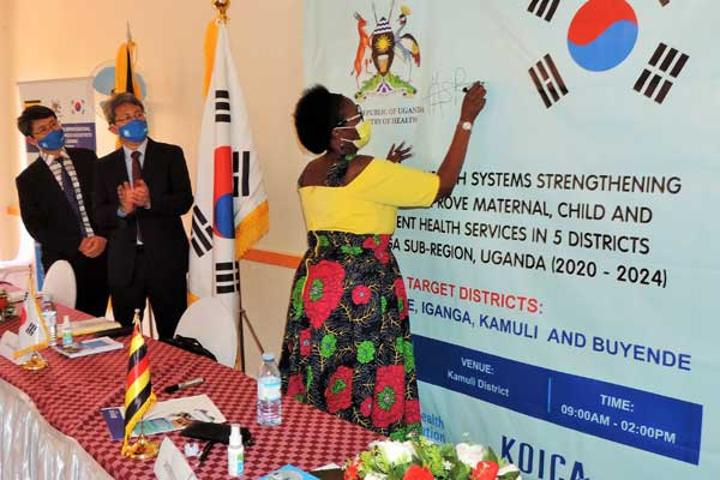Africa-Press – Uganda. The Korea International Cooperation Agency (KOICA), in collaboration with the World Health Organisation (WHO) has injected Shs35b into health systems in Bugiri, Buyende, Iganga, Mayuge, and Kamuli districts to improve child and maternal health.
The project will target 349,327 in-school adolescent boys and girls aged between 10 and 19 and 687 primary and secondary school teachers.
While launching the project in Kamuli at the weekend, the Ambassador of the Republic of Korea, Mr Ha Byung-Kyoo, said the Shs35b was a contribution towards assisting mothers to give birth and nurture healthy children, and also help the country achieve the new maternal and child health targets set by the Ministry of Health for 2025.
“It is my sincere hope that our joint efforts will enable us to realise these ambitious, but necessary goals meant to reduce maternal mortality from 336 to 220 per 100,000 live births and reduce neonatal mortality from 29 to less than 15 per 1,000 live births,” he said.
He added that their own history of maternal and child healthcare evolved from promotion of prenatal care, immunisation and family planning to introduction of national health insurance, health facility based deliveries and visits which built a healthy Korean population and became a stepping stone for the country’s development.
The State Minister for Primary Healthcare, Ms Margret Muhanga, called for community involvement, accountability and improved patient care in the project.
“We are working and engaging with multiple stakeholders to adopt innovative strategies, including scaling up best practices to address the current gaps in service delivery for maternal, child, and adolescent health in order to achieve better health outcomes for mothers and children safety issues,” she said.
Ms Muhanga further called on the district leaders to follow through this component, arguing that some reproductive health issues are still politically and culturally sensitive.
The WHO country representative, Dr Yonas Tegegn Woldermariam, emphasised mobilisation of health-seeking behaviour and practices from the population with focus on preventive rather than curative measures.
“We shall support the referral system in Busoga and already we have made available seven fully-equipped ambulances for better transportation of Women and children with emergencies and shall be refurbishing selected health facilities including water systems,” he revealed.
Maternal mortality
A report by the Ministry of Health, which was released last year, stated that there was a relative reduction in maternal mortality ratio in institutions from 108 per 100,000 deliveries in financial year 2016/2017 to 92 per 100,000 deliveries in financial year 2018/2019. Maternal mortality ratio in institutions was highest at the regional and national referral hospitals at 382 per 1,000 deliveries.
[email protected]






